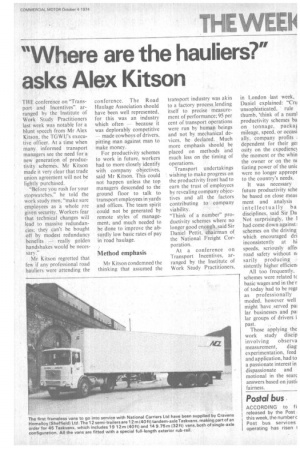"Where are the hauliers?"
Page 15

If you've noticed an error in this article please click here to report it so we can fix it.
asks Alex Kitson
THE conference on "Transport and Incentives", arranged by the Institute of Work Study Practitioners last week was notable for a blunt speech from Mr Alex Kitson, the TGWU's executive officer. At a time when many informed transport managers see the need for a new generation of productivity schemes, Mr Kitson made it very clear that trade union agreement will not be lightly purchased.
"Before you rush for your stopwatches," he told the work study men; "make sure employees as a whole are given security. Workers fear that technical changes will lead to massive redundancies; they can't he bought oft by modest redundancy benefits — really golden handshakes would be necessary."
Mr Kitson regretted that few if any professional road hauliers were attending the conference. The Road Haulage Association should have been well represented, for this was an industry which often — because it was deplorably competitive made cowboys of drivers, pitting man against man to make money.
For productivity schemes to work in future, workers had to more closely identify with company objectives, said Mr Kitson. This could not happen unless the top managers descended to the ground floor to talk to transport employees in yards and offices. The team spirit could not he generated by remote styles of management, and much needed to be done to improve the absurdly low basic rates of pay in road haulage.
Method emphasis
Mr Kitson condemned the thinking that assumed the transport industry was akin to a factory process lending itself to precise measurement of performance; 95 per cent of transport operations were run by human beings and not by mechanical devices, he declared. Much more emphasis should be placed on methods and much less on the timing of operations.
Transport undertakings wishing to make progress on the productivity front had to earn the trust of employees by revealing company objectives and all the factors contributing to company viability.
"Think of a number" productivity schemes where no longer good enough, said Sir Daniel Pettit, chairman of the National Freight Corporation.
At a conference on Transport Incentives, arranged by the Institute of Work Study Practitioners, in London •last week, Daniel explained: "Cru unsophisticated. rule thumb, 'think of a numl .productivity schemes ba on tonnage, packai mileage, speed, or occasi ally, company profits . dependent for their gei osity on the expedienc) the moment or the whin the owner or on the n( tiating power of the unic were no longer appropt to the country's needs.
It was necessary future productivity sche be based on close meas ment and analysis intellectually ba disciplines, said Sir Da Not surprisingly, the I had come down against schemes on the driving which encouraged dri inconsistently at hi speeds, seriously affec road safety without ni sarily producing sistently higher efficien, All too frequently, schemes were related tc basic wages and in the r of today had to be rega as professionally moded, however well might have served pal lar businesses and pa: lar groups of drivers i past.
Those applying the work study discip involving observa measurement, diag experimentation, feed and application, had to a passionate interest in dispassionate and motional in the searc answers based on justil fairness.
Postal bus.
ACCORDING to fi released by the Post this week, the number c Post bus services operating has risen 1












































































































